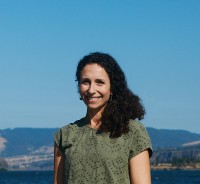For four grueling years of the Trump administration, you fought back against the dangerous threats to clean water, our health, and the climate.
By Lauren Goldberg, Legal and Program Director

And you secured big victories. From defeating new fossil fuel infrastructure to courtroom wins against Trump’s U.S. Environmental Protection Agency (EPA), the administration’s agenda did not obliterate your vision for a clean Columbia. Of course Columbia Riverkeeper sued the Trump administration. Ten lawsuits to be exact. The wheels of justice move slowly, but we’re winning. Case in point: After Riverkeeper and our partners sued the Trump EPA for failing to protect salmon and steelhead from dangerously warm river temperatures on the Snake and Columbia rivers, the Ninth Circuit Court mandated the EPA release a long-overdue protection plan in 2020. Many of our lawsuits challenging the fossil fuel industry and corporate developers are still pending. We’ll see those fights through until a court rules or we pressure the Biden administration to reverse course. During the Trump years, our sights were fixed on more than holding the line against environmental rollbacks. Yes, we played defense, but we moved the ball on offense, too. Climate action must happen now. People eat locally caught fish and drink Columbia River water today. Stopping salmon from falling over the extinction precipice can’t wait.
Together, we earned victories during the Trump years because you dug deep at every level of power. Let’s reflect on how we made progress during a dark hour in our nation’s history.
Honor the leadership of Tribal Nations. Columbia Riverkeeper worked in solidarity with Tribal Nations to support a new vision for Hanford nuclear waste cleanup, petition for a new Superfund site on the Columbia River near the Bonneville Dam, and advocate that Washington state deny the world’s largest fracked gas-to-methanol refinery. We also launched new campaigns. Tribal Nations are fighting to protect the Columbia Hills near the John Day Dam from the Pacific Northwest’s largest pumped-storage energy project. Why? More than120 acres of reservoirs would permanently destroy a bevy of sacred cultural and religious resources, and access to traditional foods and medicines. In just a month, over 1,000 Riverkeeper members signed petitions to elected officials. This fight is far from over, and we’re committed to working in solidarity with Tribal Nations until we prevail.
Gather around the kitchen table. Our team of organizers worked tirelessly with business owners, parents, farmers, and many more around kitchen tables to design strategies and actions. For example, over coffee and too many cookies, we charted a path to stop a massive petrochemical refinery for anhydrous ammonia proposed in Longview, WA, by pressuring local officials to deny building permits. In August 2020, we won. The company abandoned its proposal in the face of mounting community opposition.
Activate the masses at city halls. Riverkeeper helped channel the palpable energy of more than a dozen victories over fossil fuel infrastructure. You mobilized and convinced the Port of Vancouver to adopt climate-friendly policies, and the City of Vancouver soon followed, passing a moratorium on large-scale fossil fuel facilities in the city. You also convinced the City of Portland to pass an ordinance that sharply restricts large new oil train terminals and other fossil fuel projects. Since the ordinance passed in 2016, Riverkeeper and partners have supported the city in defending the ordinance from the fossil fuel industry’s attacks.
Take it to the people: the ballot initiative. Portland voters approved the Portland Clean Energy Fund (PCEF), a ballot measure that created a new one percent local revenue tax from the largest corporations. Communities of Color developed and led on PCEF. We were honored to serve on the steering committee and help activitate our members to engage. PCEF passed by an overwhelming 65 percent of the vote! Revenue from the new tax will fund projects that primarily benefit low-income people and Black, Indigenous, and People of Color communities—people who have historically been excluded from environmental jobs and benefits.
Hold corporate polluters accountable in court. When the government ignored illegal pollution, Columbia Riverkeeper stepped in. Since 2016, Columbia Riverkeeper has sued 24 polluters. One of the beauties of the Clean Water Act is people can prosecute polluters without waiting on a government-agency gatekeeper. Riverkeeper can go straight to court. And we did just that, stopping thousands of pounds of toxic pollution from spewing into the Columbia. This year we celebrated the fruits of a legal victory from nearly a decade ago: Oregon’s only coal-fired power plant officially shut down. It took a people-powered campaign and a lawsuit brought by Riverkeeper and our partners to end decades of dangerous air pollution at Portland General Electric’s Boardman coal-fired power plant.
Stay inspired on the river. In summer 2019, over 150 people gathered along the Columbia’s scenic Hanford Reach for The Hanford Journey, an event organized by Yakama Nation and Riverkeeper to demand a thorough cleanup of the nuclear site. In spring 2017, Riverkeeper helped organize an aquatic adaptation of the People’s Climate March, a nationwide climate day of action, along the Columbia in Kalama, WA. Our team of scientists and organizers talked to thousands of students along the Columbia’s shores and in the classroom. The lesson: This river is a place worth fighting for. Four years of the Trump administration threw up roadblocks. It also opened doors. As the climate crisis deepened, state and local decision makers couldn’t point fingers at D.C. to save us. We strategized—and prevailed—here at home on the Columbia.
Read Columbia Riverkeeper Newsletter Issue 3, 2020


